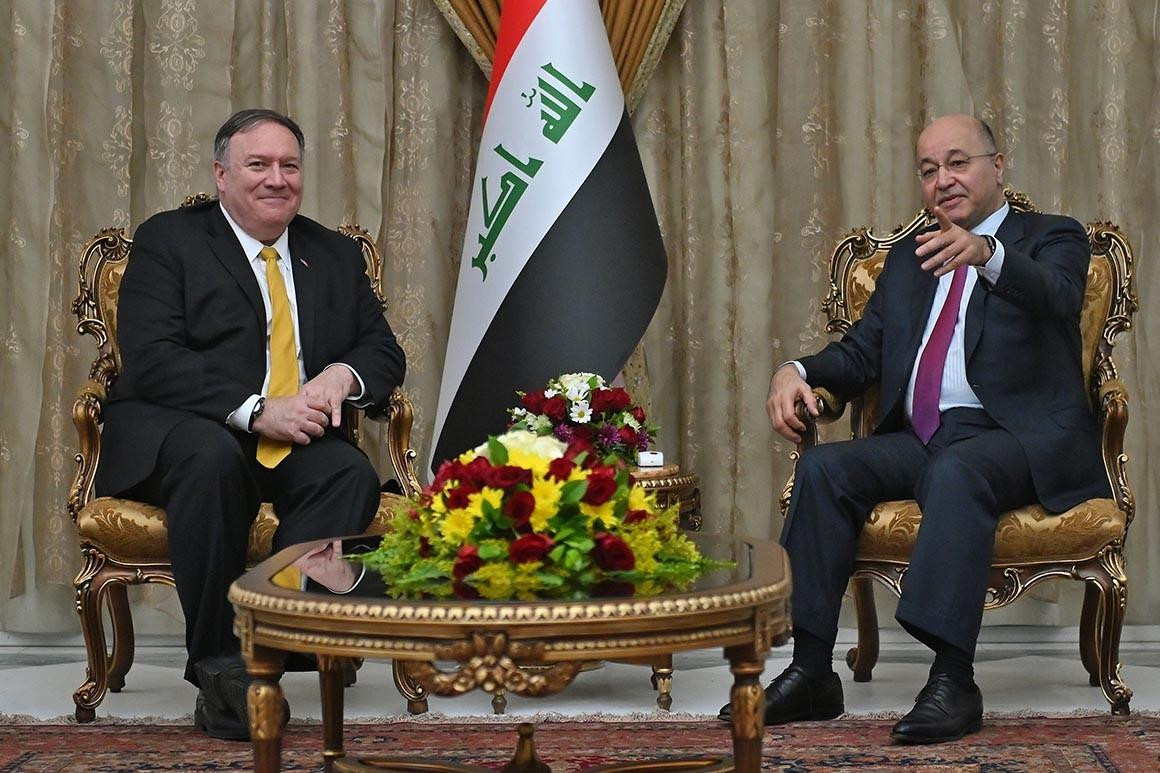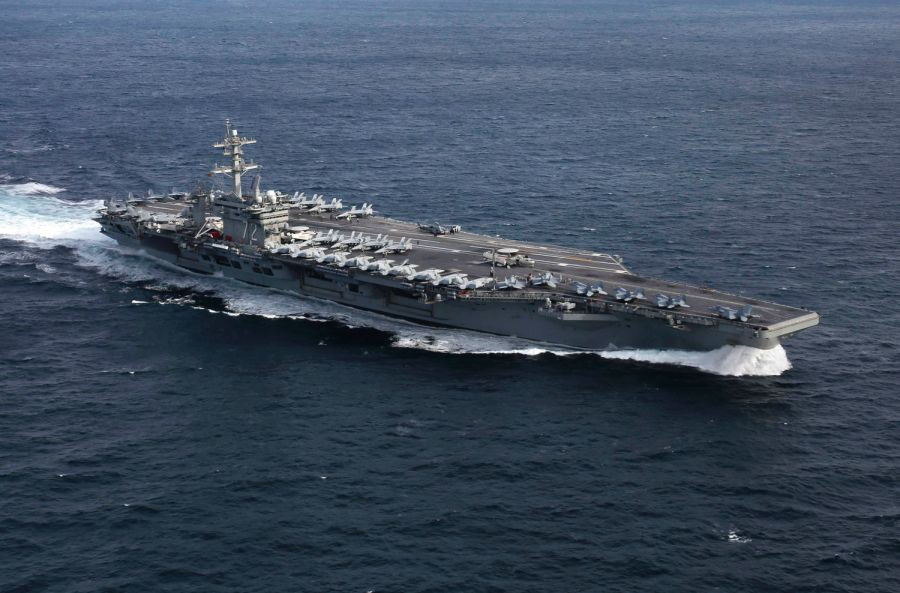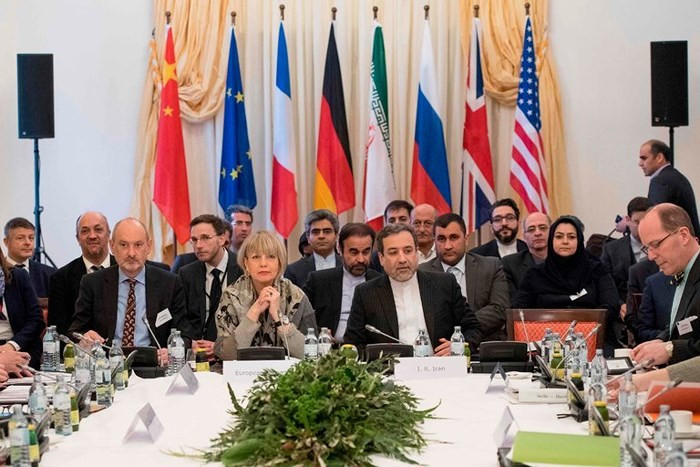US-Iran Nuclear Deal: Showing Off and Sanctions!
(Baonghean) - May 8 marks exactly one year since US President Donald Trump officially signed the memorandum withdrawing from the Iran Nuclear Agreement reached in 2015. To "welcome" this special event, both the US and Iran seem to "not give in"!
Accusing Iran of moving short-range ballistic missiles to the Gulf, the US has been sending B-52 bombers and aircraft carriers to the Middle East. At the same time, US Secretary of State Mike Pompeo had to interrupt his visit to Germany to rush to Iraq to discuss how to respond; and Iran also announced the suspension of some commitments in the Iran nuclear deal. The Middle East is once again in turmoil and no one knows where it will end!
 |
| US Secretary of State Mike Pompeo meets with Iraqi President Barham Saleh in Baghdad during his tour of the Middle East on January 9, 2019. Photo: Getty |
Tense as a bowstring
Without waiting for a full year since the US officially withdrew from the Iran Nuclear Agreement (also known as the Joint Comprehensive Plan of Action (JCPOA), the atmosphere between the two countries has been gloomy since last month, when both Washington and Tehran continuously made moves to cause tension and challenge each other. Remember in mid-April, if the US listed the Iranian Islamic Revolutionary Guard Corps as a terrorist organization, in response, Iran immediately declared the US military forces in West Asia as terrorists. By May 2, the US officially ended the sanctions exemption for 8 countries and territories importing crude oil from Iran.
It should be recalled that in November last year, the US re-imposed sanctions on Iran's crude oil exports. However, at that time, Washington applied exemptions, in which 8 countries and territories continued to buy Iranian crude oil for the next 6 months in limited quantities. By April 22, President Trump decided to end the sanctions exemptions for all 8 countries and territories, starting from May 2. Washington also did not hesitate to publicly state the purpose of this move is to force Iran to abandon its nuclear and missile programs, at the same time reducing its role in hot issues in the Middle East region. Not giving up, Iran announced that it would not rule out the possibility of blocking the strategic Strait of Hormuz if its oil exports were hindered.
The heat has increased in recent days when the US accused Iran of "mobilizing troops" to cause tension and threaten security in the region, forcing the US to take action. According to the US, many intelligence sources show that Iran seems to be moving ballistic missiles onto military ships in the Gulf and is ready for attacks on US and allied targets in Saudi Arabia, Bahrain, Qatar and not excluding US military positions in Iraq and Syria. Although no details were revealed, some sources said that Washington had this intelligence information from its close ally, Israel. In response, the US has begun to deploy the USS Abraham Lincoln aircraft carrier and a squadron of B-52 Stratofortress strategic bombers to the Gulf.
 |
| US aircraft carrier USS Abraham Lincoln. Photo: US Navy |
Cancel visit to Germany, rush to Iraq
Citing “urgent security concerns,” US Secretary of State Mike Pompeo abruptly canceled his planned visit to Germany with meetings with Chancellor Merkel and the country’s Foreign Minister. Instead, Pompeo immediately made a surprise visit to Iraq, an ally. According to limited media reports, Pompeo met with Iraqi Prime Minister Adel Abdul Mahdi and several senior officials. The meetings were aimed at discussing the safety of Americans in Iraq and expressing concerns about Iran.
It is not difficult to explain why, in the midst of the "hot water" with Iran, the US immediately turned to its ally Iraq. Because this is a country with about 5,000 US soldiers stationed. More importantly, the US is especially worried that its close ally at this crucial moment could lean towards Iran. According to observers, the warm handshake between the two neighbors Iran and Iraq not only promotes bilateral cooperation but can also have a great impact on hot issues in the region, such as the Syrian war, the Lebanon crisis or the fight against terrorism... Not to mention, along with better relations with Iraq, pro-Iran forces in the region such as Hezbollah, Houthi or Hamas also do not hesitate to show support for Tehran by attacking US strategic interests in the region.
 |
| Parties participating in the 2015 Iran nuclear deal negotiations. Photo: Internet |
Who wins - who loses?
As tensions increase, everyone understands that both the US and Iran, despite harboring many strategic goals, cannot avoid immediate damage. As with the US, on the surface, it is tightening sanctions and isolating Iran, but it seems that the US is indirectly making the relationship between Iran and its global oil-buying partners become "closer", although it may have to be in a different way. Not only that, according to some military experts, the USS Abraham Lincoln aircraft carrier that the US has just sent to the Middle East is actually not suitable for the mission, because these aircraft carriers are designed for operations on open seas. Therefore, if a conflict occurs, there is a risk of putting thousands of US sailors at a great military disadvantage, because these aircraft carriers are vulnerable to passive attacks in a narrow and limited sea area.
Meanwhile, Iran in a series of latest statements still shows a tough attitude towards the US. Although affirming that it will not withdraw from the agreement, Iran has just informed the ambassadors of the UK, France, Germany, China and Russia about its decision to "stop implementing some commitments" within the framework of the 2015 nuclear agreement signed with the P5+1 powers (including the US, UK, France, Russia, China and Germany). Previously, Iranian President Rouhani also announced that he would restart the nuclear program in response to the US. However, at the same time, a source from the French Presidential Palace said that the European Union (EU) will be forced to re-impose sanctions on Iran if Tehran abandons part of the nuclear agreement.
This is a significant change in attitude when European countries have recently made many statements supporting Iran. Moreover, in terms of economy, it is undeniable that US sanctions have seriously affected Iran's economy, which is mainly dependent on oil. For example, as soon as the US withdrew from the Iran Nuclear Agreement last year, the country's oil exports decreased by 25%, the Rial lost 70% of its value, and inflation increased by nearly 50%...
Not only causing economic, military and strategic damage to both sides, the increasing US-Iran tensions are making the already complicated Middle East region even hotter. Everyone understands that the US, through a series of tightening and showing off measures, aims to pressure Iran to stop developing ballistic missiles as well as its nuclear weapons development program. Washington also wants Iran to stop supporting the regime of Syrian President Bashar Al-Assad, Hezbollah in Lebanon, Houthi in Yemen or Hamas in Palestine...
More importantly, the US wants an isolated and economically weakened Iran to be forced to sit down at the negotiating table with the US on a new agreement regarding the nuclear issue. However, on the contrary, Iran will certainly not be pressured and have to make unreasonable concessions to the US. Therefore, at this time, as long as no one is willing to give in, both the US and Iran will suffer immeasurable damage!
